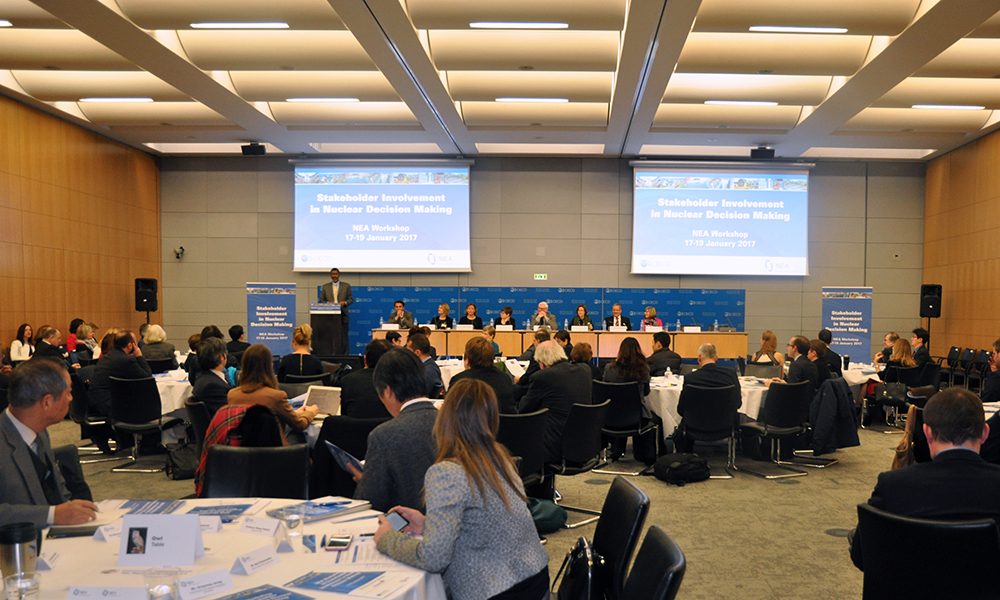International Nuclear Law Essentials
Paris, France
20-24 February 2017
Welcome to the OECD Nuclear Energy Agency
The Nuclear Energy Agency (NEA) is a specialised agency within the Organisation for Economic Co-operation and Development (OECD), an intergovernmental organisation of industrialised countries, based in Paris, France. More...
Press releases and news
 Stakeholder Support and Involvement Essential to Future of Nuclear Energy Decision Making
Stakeholder Support and Involvement Essential to Future of Nuclear Energy Decision Making
Over 130 experts from 26 countries have come together to discuss international best practices and concluded that stakeholder support and involvement are essential to achieving accepted and sustainable decisions for nearly all aspects of nuclear energy. On 17-19 January 2017, the experts convened in Paris at the NEA Workshop on Stakeholder Involvement in Nuclear Decision Making to compare their vast array of experiences and to identify approaches that help contribute, or not, to stakeholder confidence; to discuss the laws, policies and programmes underway in different countries; and to develop a collective wisdom from which all may learn and benefit. In addition to sharing experiences and best practices, during the workshop participants debated such questions as who among the members of the public and other stakeholders should be informed and how science should be used to address their concerns regarding the choices to be made; in what ways can the full array of viewpoints be put into a balanced perspective; and what roles can and should social media play in engaging with stakeholders. Read more
 Developing and implementing geological repositories for long-lived radioactive waste
Developing and implementing geological repositories for long-lived radioactive waste
On 6-9 December 2016, the NEA and the French national radioactive waste management agency Andra held the fifth International Conference on Geological Repositories (ICGR) in Paris, France. The conference, on "Continued Engagement and Safe Implementation of Geological Repositories", convened senior‑level decision‑makers representing international and national bodies from countries that are in different stages of implementing deep geological repository programmes. Participants underlined the added value of international co‑operation for the safe implementation of geological repository projects and concluded that deep geological repositories remain a viable and safe option for the management of radioactive waste. The scientific knowledge and technical bases relating to the disposal of radioactive waste are being enhanced and the technical design of repositories will be further optimised through current and future R&D programmes. Participants also noted that current strategies for repository implementation follow international standards, recommendations and best practices for nuclear safety and security. The important role of continued stakeholder dialogue in advancing a geological repository project was also highlighted. Conference proceedings are in preparation and will be issued online.
 MOU to enhance co-operation between NEA and KORAD
MOU to enhance co-operation between NEA and KORAD
On 6 December 2016, the Nuclear Energy Agency (NEA) of the Organisation for Economic Co‑operation and Development (OECD) and the Korea Radioactive Waste Agency (KORAD) signed a Memorandum of Understanding (MOU) in the Area of Management of Radioactive Waste and Spent Nuclear Fuel, fostering co‑operation between both parties. A signing ceremony was held in the presence of Dr Jong‑In Lee, KORAD President and Chief Executive Officer, and Mr William D. Magwood, IV, NEA Director‑General. The MOU specifically aims to facilitate and support co‑operation within the framework of the NEA Radioactive Waste Management Committee (RWMC) activities.
 Ensuring food safety in a post-accident situation
Ensuring food safety in a post-accident situation
On 8-10 November 2016, the NEA held an international workshop on "Post‑accident Food Safety Science" in Fukushima, Japan. Hosted by the Cabinet Office of the Government of Japan, the workshop brought together 137 participants, including experts and scientists from ten countries and local residents, to discuss the state of the art in post‑accident food safety science; the local, national and international management of post‑accident food safety; and approaches for addressing associated challenges. The workshop started with two sessions describing the current state of food and agriculture in Japan and the extensive work done in the aftermath of the Fukushima Daiichi nuclear power plant accident by farmers, distributors, prefectures and the central government to ensure that marketed products meet rigorous national standards. The final two sessions addressed the international standards, decontamination and measurement science, as well as the post‑Chernobyl food management experience of Belarus, Norway and the United Kingdom. The workshop, which also featured a technical site visit to several food monitoring facilities, concluded that food management efforts of Japan were excellent and represented a good technical example for other countries.
New publications and reports
NEA Strategic Plan 2017-2022
Read the plan | Français
Nuclear Energy Data 2016
Read the report
Management of Radioactive Waste after a Nuclear Power Plant Accident
Read the report
Uranium 2016: Resources, Production and Demand
Read the report
Small Modular Reactors: Nuclear Energy Market Potential for Near-term Deployment
Read the report

